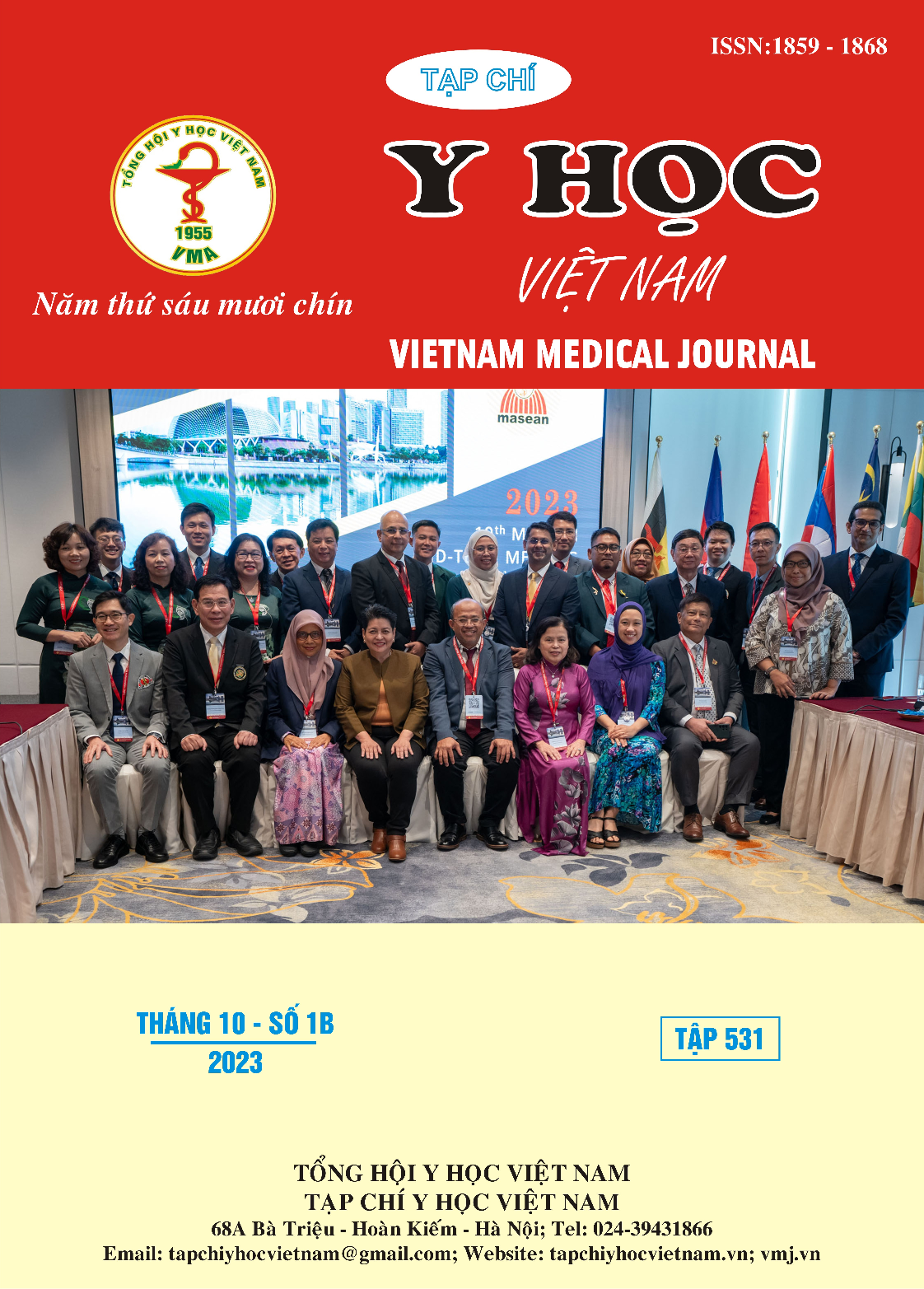ASSESSING THE EFFECTIVENESS OF PACLITAXEL – CARBOPLATIN REGIMEN IN PATIENTS WITH PLATINUM-SENSITIVE RECURRENT OVARIAN CANCER
Main Article Content
Abstract
Objectives: Evaluating the results of paclitaxel-carboplatin regimen in patients with platinum-sensitive recurrent ovarian cancer at Nghe An Oncology Hospital. Subjects and methods: Descriptive, retrospective, and prospective study on 44 patients with platinum-sensitive recurrent epithelial ovarian carcinoma who were treated with carboplatin plus paclitaxel at Nghe An Oncology Hospital from January 2017 to September 2022. Results: Some general characteristics of the group of patients: The mean age was 59.5 years old. The age group from 50-69 is the most common group, accounting for 79.5%. High-grade serous carcinoma was the most common histology subtype with 84.1%. 29.5% of patients relapse within 6-12 months after primary treatment and 70.5% relapse over 12 months. CA12.5 levels increased in 86.4% of patients. 43.2% of the patients underwent surgery to reduce the total tumor at recurrence. Treatment results: The response rate was 69.7% (23/33), 11 patients with complete response accounted for 33.3%, 12 patients with partial response accounted for 36.4%. Median progression-free survival was 11.1 months (95% CI: 9.4 – 2.7); Median overall survival was 30.1 months (95% CI: 18.2 – 40.0). At the end of the study, there were 20 patients alive, accounting for 45.5%. Common toxicity was hair loss, neurotoxicity, leukopenia and thrombocytopenia, almost all were grade 1-2. There were 4 patients who stopped chemotherapy due to toxicity, including 1 patient with anaphylaxis of carboplatin, 1 patient with grade 3 neurotoxicity and 2 patients with grade 3 and 4 thrombocytopenia. No patient died of toxicities. Conclusion: Paclitaxel-Carboplatin-based regimen is an effective regimen and tolerable for patients with platinum-sensitive recurrent ovarian carcinoma.
Article Details
Keywords
Recurrent ovarian cancer, platinum-sensitive, paclitaxel – carboplatin
References
2. Raja FA, Counsell N, Colombo N, et al. Platinum versus platinum-combination chemotherapy in platinum-sensitive recurrent ovarian cancer: a meta-analysis using individual patient data. Annals of Oncology. 2013;24 (12):3028-3034. doi:10.1093/annonc/mdt406
3. M K B Parmar, J A Ledermann, N Colombo, A du Bois. Paclitaxel plus platinum-based chemotherapy versus conventional platinum-based chemotherapy in women with relapsed ovarian cancer: the ICON4/AGO-OVAR-2.2 trial. The Lancet. 2003;361(9375):2099-2106. doi:10.1016/S0140-6736(03)13718-X
4. González-Martín AJ, Calvo E, Bover I, et al. Randomized phase II trial of carboplatin versus paclitaxel and carboplatin in platinum-sensitive recurrent advanced ovarian carcinoma: a GEICO (Grupo Español de Investigación en Cáncer de Ovario) study. Annals of Oncology. 2005;16(5):749-755. doi:10.1093/annonc/mdi147
5. Dizon DS, Hensley ML, Poynor EA, et al. Retrospective Analysis of Carboplatin and Paclitaxel as Initial Second-Line Therapy for Recurrent Epithelial Ovarian Carcinoma: Application Toward a Dynamic Disease State Model of Ovarian Cancer. JCO. 2002;20(5):1238-1247. doi:10.1200/JCO.2002.20.5.1238
6. Wagner U, Marth C, Largillier R, et al. Final overall survival results of phase III GCIG CALYPSO trial of pegylated liposomal doxorubicin and carboplatin vs paclitaxel and carboplatin in platinum-sensitive ovarian cancer patients. Br J Cancer. 2012;107(4):588-591. doi:10.1038 /bjc.2012.307
7. Harter P, Sehouli J, Vergote I, et al. Randomized Trial of Cytoreductive Surgery for Relapsed Ovarian Cancer. N Engl J Med. 2021; 385(23):2123-2131. doi:10.1056/NEJMoa2103294


